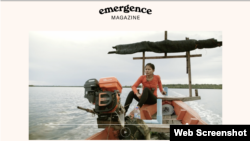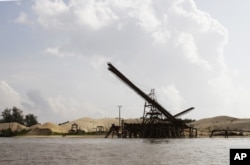Vy Phalla has a deep attachment to her hometown in Cambodia’s Koh Kong province, a land where mangroves ring the sandy coast and the waters teem with fish and crabs, providing sustenance to generations of villagers.
So when large-scale sand dredging off the coast of her village, Koh Srolao, began to destroy fish stocks and other aspects of the natural environment, Phalla, a 31-year-old fisherwoman, was deeply distressed.
I felt that my blood, life, and soul had been taken away from me.
Still, she felt powerless against the large business interests that have for years been removing huge quantities of sand off Cambodia’s coast, much of which is sold to Singapore for the city-state’s land reclamation efforts.
That’s why Phalla jumped at the opportunity to collaborate with the award-winning Cambodian-American filmmaker Kalyanee Mam on a new short film, “Lost World,” which deploys striking images of daily life in Koh Kong to show how dredging is devastating local communities.
(Courtesy of Emergence Magazine)
The film had no script, Phalla told VOA in a recent interview. Instead, she simply spoke from personal experience, narrating the story of her community and helping Mam capture images that would convey the urgency of the situation.
She said that since the dredging began, many children have dropped out of school to help their families, as it is so much harder to make a living from fishing. Some natives of Koh Srolao have been forced to leave the village and become laborers in Thailand or Phnom Penh.
“The problems happened in my community one after another,” said Phalla. “So I was able to tell the story from my heart—pain, disappointment, and sorrow.”
She said she worked with Mam for about three or four months in Koh Sralao. The film shows her going about her daily life, digging for shellfish and singing songs about the beauty of the coastal mangroves.
“In some islands, we used to get more from fishing,” she said. “I felt pain when we couldn’t fish anymore, and we lost fishing areas.”
I shed a tear when I arrived in Singapore.
The film also follows Phalla on a visit to Singapore, one of the world’s wealthiest countries. While many visitors enjoy the vibrancy of Singapore’s urban landscape, Phalla said she found it depressing.
“I shed a tear when I arrived in Singapore," she said.
Phalla said she wished she could tell Singaporeans how the land beneath their feet had been purchased with Cambodian livelihoods.
“When I arrived in Singapore, I felt so much pain, even more than how I felt in my village,” she said.
“I felt that my blood, life, and soul had been taken away from me,” she added.
Phalla’s family was worried about the possible consequences of her increasing outspokenness against sand dredging, because many local activists had faced threats, intimidation and even jail time.
The founder of the environmental group Mother Nature, Alex Gonzalez-Davidson, was forced to flee Cambodia, while two members of Mother Nature were sentenced to prison terms this year for filming a sand-dredging ship off the coast of Koh Kong.
“For my family, because people who were involved in the sand dredging issue were imprisoned, when they learned that I had been filming, they were afraid that I would be arrested,” said Phalla.
Some of Phalla’s neighbors also warned her that her work on “Lost World” could cause trouble.
“They told me that I shouldn’t be too brave to be the main character in the film, because if something happened, the director would run away and I would be responsible for that,” she said.
But she said she had no fear of getting involved, because everything she did was grounded in truth.
“I am not afraid because I told myself that, no matter what happens, I'll accept the consequences because I haven't manipulated anything, and it is a true story and true life,” she said.
Phalla has high expectations for her work. She hopes that “Lost World” will introduce viewers abroad to the beauty of Koh Srolao, and raise awareness of the serious effects of sand dredging on Cambodian communities.
“I hope that the coastal area will be preserved, and the mangroves will still be beautiful without any damage,” she said.





